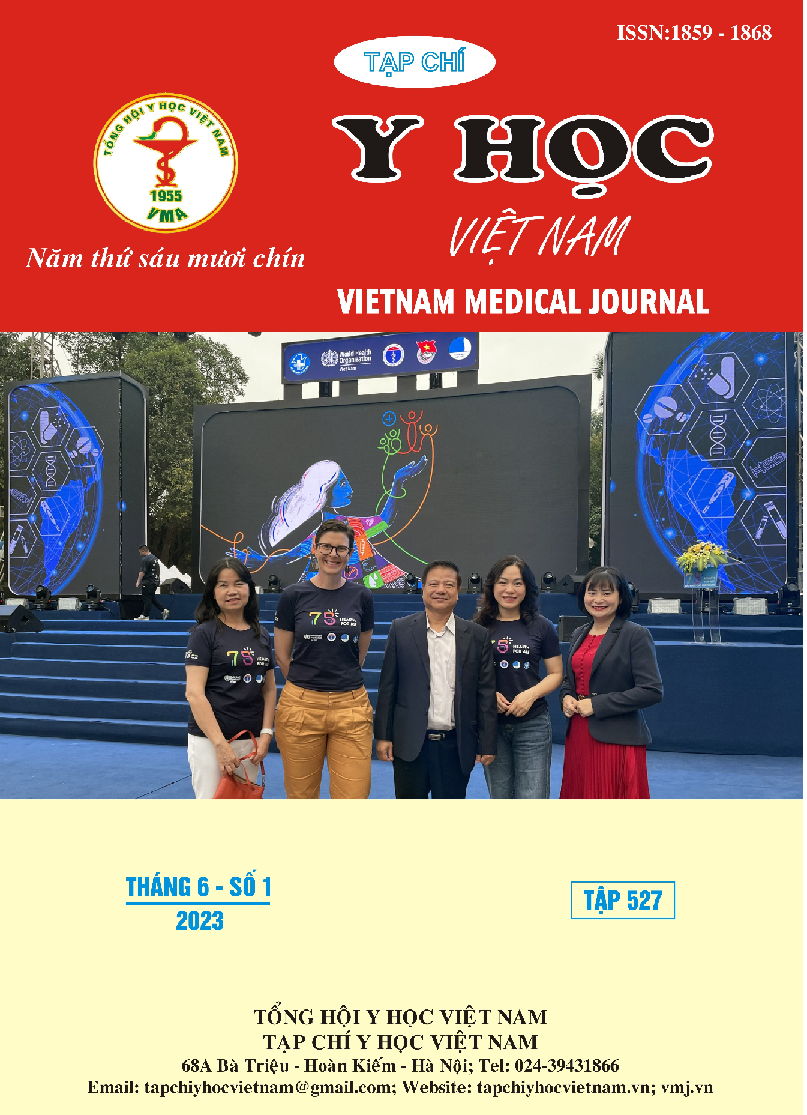VALIDITY AND RELIABILITY OF NURSES’ KNOWLEDGE, ATTITUDES, AND PRACTICES REGARDING ENHANCED RECOVERY AFTER SURGERY (ERAS) QUESTIONNAIRE
Main Article Content
Abstract
Background: Developing a tailored questionnaire assessing knowledge, attitudes and practices (KAP) of nurses about Enhanced Recovery After Surgery (ERAS) program is necessary to identify the knowledge, attitudes and practices gaps, thereby facilitating interventions to improve the efficiency of care for patients after surgery. This study was conducted to evaluate the validity and reliability of knowledge, attitudes and practices regarding ERAS questionnaire for surgical nurses. Research object and method: The questionnaire on knowledge, attitudes and practices regarding ERAS was developed, based on guildlines and literatures related to ERAS. The validity was measured through 5 experts’ opinion, by the Iterm content validity index, scale content validity index (I-CVI, S-CVI) and the interrater reliability (Cohen's Kappa). The reliability was examined on 102 nurse’s feedback data with 3 main parameters: consistency coefficient (Cronbach's Alpha), internal consistency reliability by Split-Half reliability and partial correlation between the variables with Kaiser Meyer Olkin test (KMO). Results: The I-CVI values of knowledge, attitudes and practices component reached from 0.8 – 1.0. The range of S-CVI was 0.99 – 1.0 and Cohen's Kappa was 0.76 – 1.0. The coefficient of consistency Cronbach's Alpha in the components of knowledge, attitudes, and practices was 0.67, 0.89, and 0.86, respectively. The whole questionnaire’s Cronbach's Alpha was 0.81 (p<0.05). The Split-Half coefficient of knowledge component was 0.61- 0,6, attitude was 0.80 -0,82, and practice was 0.76 - 0.84. The KMO coefficient is 0.7 (p<0.05). Conclusion: This questionnaire has high validity and reliability and was able to be used to assess the knowledge, attitudes and practices regarding ERAS of nurses.
Article Details
Keywords
Nurse, Knowledge, Atittudes, Practices, Enhanced Recovery After Surgery, ERAS
References
2. Batchelor, T., Rasburn, N. J., Abdelnour-Berchtold, E., Brunelli, A., Cerfolio, R. J., Gonzalez, M., Ljungqvist, O., Petersen, R. H., Popescu, W. M., Slinger, P. D., & Naidu, B. Guidelines for enhanced recovery after lung surgery: recommendations of the Enhanced Recovery After Surgery (ERAS®) Society and the European Society of Thoracic Surgeons (ESTS). European journal of cardio-thoracic surgery: official journal of the European Association for Cardio-thoracic Surgery, 2019, 55(1), 91–115.
3. Bujang MA, Omar ED, Baharum NA. A Review on Sample Size Determination for Cronbach's Alpha Test: A Simple Guide for Researchers. Malays J Med Sci. 2018;25(6):85-99.
4. Goni M.D., Naing N.N., Hasan H., Wan-Arfah N., Deris Z.Z., Arifin W.N., Hussin T.M., Abdulrahman A.S., Baaba A.A., Arshad M.R. Development and validation of knowledge, attitude and practice questionnaire for prevention of respiratory tract infections among Malaysian Hajj pilgrims. BMC Public Health. 2020;20:189. doi: 10.1186/s12889-020-8269-9.
5. Leontitsis A., Pagge J. A simulation approach on Cronbach’s alpha statistical significance. Math. Comput. Simul. 2007; 73: 336–340. 10.1016/j.matcom.2006.08.001
6. Lynn MR. Determination and quantification of content validity. Nurs Res. 1986; 35(6):382-5. Epub 1986/11/01. PubMed PMID: 3640358
7. McHugh ML. Interrater reliability: the kappa statistic. Biochemia medica. 2012; 22(3):276-82
8. Pronk T, Molenaar D, Wiers RW, Murre J. Methods to split cognitive task data for estimating split-half reliability: A comprehensive review and systematic assessment. Psychon Bull Rev. 2022; 29(1):44-54. doi:10.3758/s13423-021-01948-3


